Described as a cross between a traditional book club and a university course without exams, this popular program is in-person and online for the 2022-23 season! This registration option is for the Tuesday and Thursday ONLINE subscription option.
A link will be sent to subscribers between 7:00 and 7:30 pm on the day of the lecture. The links to the lectures will be accessible from their launch date until August 31, 2023.
Other subscription options are available here: https://www.heliconianclub.org/about-the-2022-23-series.html
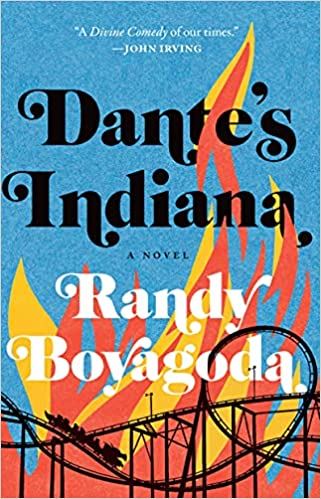
Dante’s Indiana is affecting and strange, intimate and big-hearted—an extraordinary journey through the darkly divine comedies of our time..
Middle-aged, married, but living on his own, Prin has lost his way. Desperate for money and purpose, he moves to small-town Indiana to work for an evangelical millionaire who’s building a theme park inspired by Dante’s Inferno. He quickly becomes involved in the difficult lives of his co-workers and in the wider struggles of their opioid-ravaged community while trying to reconcile with his distant wife and distant God. Both projects spin out of control, and when a Black teenager is killed, creationists, politicians and protesters alike descend. In the midst of this American chaos, Prin risks everything to help the lost and angry souls around him while searching for his own way home.
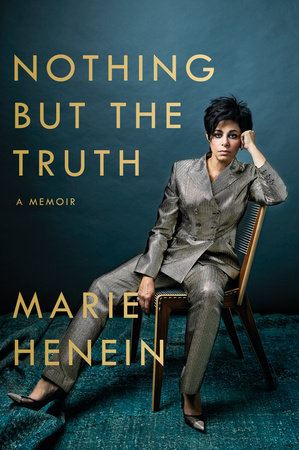
An intimate memoir by Canada's top defence lawyer, Nothing But the Truth weaves Marie Henein's personal story with her strongly held views on society's most pressing issues, legal and otherwise. Her story, as an immigrant from a tightknit Egyptian-Lebanese family, demonstrates the value of strong role models--from her mother and grandmother, to her brilliant uncle Sami who died of AIDS. She learned the value of hard work, being true to herself and others, and unapologetically owning it all.
Marie Henein shares her unvarnished view on the ethical and practical implications of being a criminal lawyer, and how the job is misunderstood and even demonized. Ironically, her most successful cases made her a "lightning rod" in some circles, confirming her belief that much of the public's understanding of the justice system is based on popular culture, and social media, and decidedly not the rule of law. Nothing But the Truth is refreshingly unconstrained and surprising--a woman at the top of her game in a male-dominated world.
OCTOBER 13 – LINDA RUI FENG: SWIMMING BACK TO TROUT RIVER
 Swimming Back to Trout River is set against the backdrop of China’s Cultural Revolution that follows a father’s quest to reunite his family before his precocious daughter’s momentous birthday. How many times in life can we start over without losing ourselves?
Swimming Back to Trout River is set against the backdrop of China’s Cultural Revolution that follows a father’s quest to reunite his family before his precocious daughter’s momentous birthday. How many times in life can we start over without losing ourselves?
In the summer of 1986 in a small Chinese village, ten-year-old Junie receives a momentous letter from her parents, who had left for America years ago: her father promises to return home and collect her by her twelfth birthday. But Junie’s growing determination to stay put in the idyllic countryside with her beloved grandparents threatens to derail her family’s shared future.
What Junie doesn’t know is that her parents, Momo and Cassia, are newly estranged from one another in their adopted country, each holding close private tragedies and histories from the tumultuous years of their youth during China’s Cultural Revolution. While Momo grapples anew with his deferred musical ambitions and dreams for Junie’s future in America, Cassia finally begins to wrestle with a shocking act of brutality from years ago. In order for Momo to fulfill his promise, he must make one last desperate attempt to reunite all three members of the family before Junie’s birthday—even if it means bringing painful family secrets to light. Longlisted for the 2021 Scotiabank Giller Prize
OCTOBER 25 – KATHLEEN WINTER: UNDERSONG
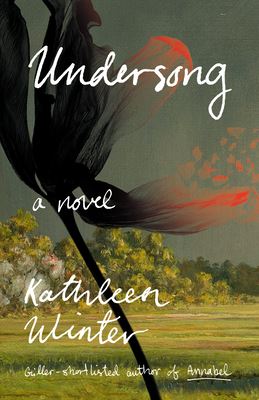 Undersong is a stunning novel reimagining the lost years of misunderstood Romantic Era genius, Dorothy Wordsworth.
Undersong is a stunning novel reimagining the lost years of misunderstood Romantic Era genius, Dorothy Wordsworth.
When young James Dixon, a local jack-of-all-trades recently returned from the Battle of Waterloo, meets Dorothy Wordsworth, he quickly realizes he’s never met another woman anything like her. In her early thirties, Dorothy has already lived a wildly unconventional life. And as her famous brother William Wordsworth’s confidante and creative collaborator—considered by some in their circle to be the secret to his success as a poet—she has carved a seemingly idyllic existence for herself, alongside William and his wife, in England’s Lake District.
One day, Dixon is approached by William to do some handiwork around the Wordsworth estate. Soon he takes on more and more chores—and quickly understands that his real, unspoken responsibility is to keep an eye on Dorothy, who is growing frail and melancholic. The unlikely pair of misfits form a sympathetic bond despite the troubling chasm in social class between them, and soon Dixon is the quiet witness to everyday life in Dorothy’s family and glittering social circle, which includes literary legends Samuel Coleridge, Thomas de Quincy, William Blake, and Charles and Mary Lamb.
Through the fictional James Dixon—a gentle but troubled soul, more attuned to the wonders of the garden he faithfully tends than to vexing worldly matters—we step inside the Wordsworth family, witnessing their dramatic emotional and artistic struggles, hidden traumas, private betrayals and triumphs.
NOVEMBER 17– KIM THUY: EM
 In the midst of war, an ordinary miracle: an abandoned baby tenderly cared for by a young boy living on the streets of Saigon. The boy is Louis, the child of a long-gone American soldier. Louis calls the baby em Hồng, em meaning "little sister," or "beloved." Even though her cradle is nothing more than a cardboard box, em Hồng's life holds every possibility.
In the midst of war, an ordinary miracle: an abandoned baby tenderly cared for by a young boy living on the streets of Saigon. The boy is Louis, the child of a long-gone American soldier. Louis calls the baby em Hồng, em meaning "little sister," or "beloved." Even though her cradle is nothing more than a cardboard box, em Hồng's life holds every possibility.
Through the linked destinies of a family of characters, the novel takes its inspiration from historical events, from Operation Babylift, which evacuated thousands of biracial orphans from Saigon in April 1975, to the remarkable growth of the nail salon industry, dominated by Vietnamese expatriates all over the world. From the rubber plantations of Indochina to the massacre at My Lai, Kim Thúy sifts through the layers of pain and trauma in stories we thought we knew, revealing transcendent moments of grace and the invincibility of the human spirit.
Kim Thúy's Em is a virtuosic novel of profound power and sensitivity, and an enduring affirmation of the greatest act of resistance: love.
NOVEMBER 29 ANNE-MARIE MACDONALD: FAYNE
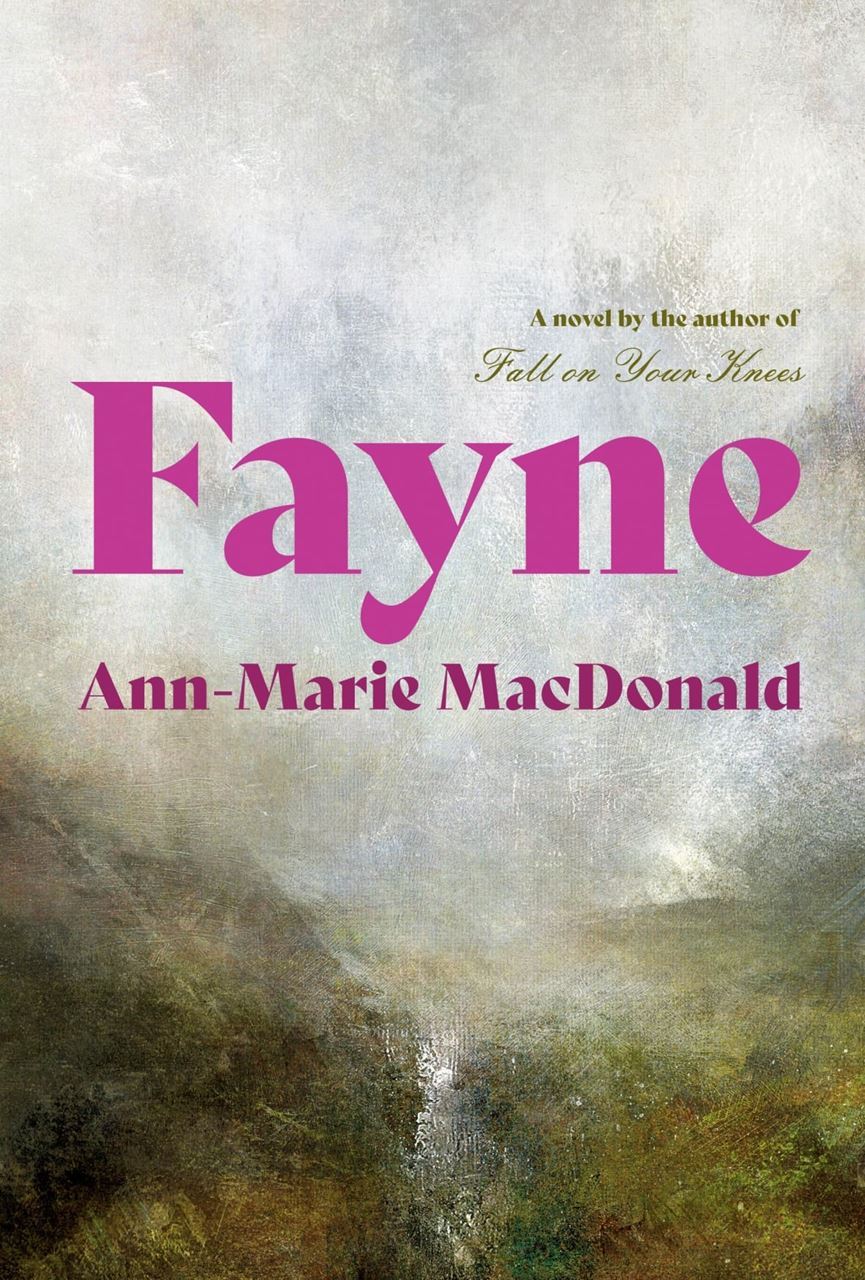 In the late nineteenth century, Charlotte Bell is growing up at Fayne, a vast and lonely estate straddling the border between England and Scotland, where she has been kept from the world by her adoring father, Lord Henry Bell, owing to a mysterious condition. Charlotte, strong and insatiably curious, revels in the moorlands, and has learned the treacherous and healing ways of the bog from the old hired man, Byrn, whose own origins are shrouded in mystery. Her idyllic existence is shadowed by the magnificent portrait on the landing in Fayne House that depicts her mother, a beautiful Irish-American heiress, holding Charlotte’s brother, Charles Bell. Charlotte has grown up with the knowledge that her mother died giving birth to her, and that her older brother, Charles, the long-awaited heir, died soon afterwards at the age of two.
In the late nineteenth century, Charlotte Bell is growing up at Fayne, a vast and lonely estate straddling the border between England and Scotland, where she has been kept from the world by her adoring father, Lord Henry Bell, owing to a mysterious condition. Charlotte, strong and insatiably curious, revels in the moorlands, and has learned the treacherous and healing ways of the bog from the old hired man, Byrn, whose own origins are shrouded in mystery. Her idyllic existence is shadowed by the magnificent portrait on the landing in Fayne House that depicts her mother, a beautiful Irish-American heiress, holding Charlotte’s brother, Charles Bell. Charlotte has grown up with the knowledge that her mother died giving birth to her, and that her older brother, Charles, the long-awaited heir, died soon afterwards at the age of two.
When Charlotte’s appetite for learning threatens to exceed the bounds of the estate, her father breaks with tradition and hires a tutor to teach his daughter “as you would my son, had I one.” But when Charlotte and her tutor’s explorations of the bog turn up an unexpected artefact, her father announces he has arranged for her to be cured of her condition, and her world is upended. Charlotte’s passion for knowledge and adventure will take her to the bottom of family secrets and to the heart of her own identity.
JANUARY 19– LISA ROCHON: TUSCAN DAUGHTER
 Tuscan Daughter set during the Italian Renaissance and Beatrice, a young and defiant female artist, is searching for her mother.
Tuscan Daughter set during the Italian Renaissance and Beatrice, a young and defiant female artist, is searching for her mother.
Florence in 1500, is a city that glitters with wealth and artistic genius but it is also a place of fierce political intrigue, walled off from the unrest in the surrounding Tuscan countryside. In this moment, a peasant girl finds herself alone after her father is killed and her mother disappears. Young Beatrice must dare to enter the city to sell her family’s olive oil in order to survive, but also to search the streets and opium dens for her missing, grieving mother.
Walking barefoot from her outlying village, Beatrice is given grudging permission to pass through the city gates to sell olive oil to the artists—Michelangelo, Leonardo da Vinci, Botticelli—who toil to elevate the status of the Florentine Republic. Lonely yet defiant, the peasant girl draws on the stone walls of Florence in secret as a way to express her pain. While desperately searching the city for her mother, Beatrice befriends the upstart Michelangelo as he struggles to sculpt the David. She also comes to know a cloth merchant’s wife who is having her portrait painted by the aging Leonardo da Vinci, renowned through the land as Master of the Arts. Bonds deepen even while Michelangelo and Leonardo are pitted against each other.
Set during five epic years in the early 1500s when Florence was rebranding itself through its creative geniuses, Tuscan Daughter reveals the humanity and struggles of a young woman longing to find the only family she has left and be an artist in her own right, and the way she influences the artistic masters of the time to stake everything on the power of beauty to transform and heal.
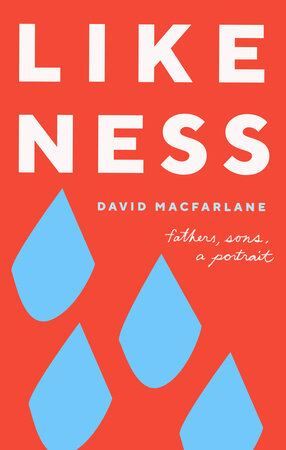 From one of Canada's most celebrated writers and the author of the classic memoir The Danger Tree comes an occasionally hilarious, sometimes heart-breaking meditation on love, memory, and the fathomless depths of grief.
From one of Canada's most celebrated writers and the author of the classic memoir The Danger Tree comes an occasionally hilarious, sometimes heart-breaking meditation on love, memory, and the fathomless depths of grief.
Likeness is a multi-generational story told through the vehicle of a painting, a portrait of Macfarlane by the well-known Canadian artist, John Hartman. The painting has ended up unexpectedly, temporarily, and enormously in Macfarlane's living room. He looks at it—a lot. It's hard to avoid.
To Macfarlane's surprise, the painting becomes a portal—not only into his own past, but into his father's, too. Through these two histories is woven the present—one dominated by illness. Macfarlane's son undergoes treatment for leukemia during the time the painting hangs in the family living room. Blake is a young man rich in creative possibility. There is music to be composed. There are films to be made. But Blake's future is as circumscribed by fate as his father's was wide open. A tragic difference, eloquently noted.
Likeness can be very funny. But it is also inescapably, achingly sad. A book of transcendent beauty, Likeness demonstrates the power of memory to transform the tragic into the precious and profound.
FEBRUARY 16 - DAMON GALGUT: THE PROMISE
Suanne Kelman will lecture on The Promise
 The Promise, winner of the 2021 Booker Prize, is a modern family saga. The novel charts the decline of a white family during South Africa’s transition out of apartheid. It begins in 1986, with the death of Rachel, a 40-year-old Jewish mother of three on a smallholding outside Pretoria. The drama of the novel turns on a promise that her Afrikaner husband, Manie, made to her before she died, overheard by their youngest daughter, Amor: that Manie would give their black maid, Salome, the deeds to the annexe she occupies. Now that Rachel is dead, Manie has apparently forgotten and doesn’t care to be reminded. Nor does his bigoted family, who regard Amor’s stubborn insistence that Salome should own her home as the kind of talk that “now appears to have infected the whole country”.
The Promise, winner of the 2021 Booker Prize, is a modern family saga. The novel charts the decline of a white family during South Africa’s transition out of apartheid. It begins in 1986, with the death of Rachel, a 40-year-old Jewish mother of three on a smallholding outside Pretoria. The drama of the novel turns on a promise that her Afrikaner husband, Manie, made to her before she died, overheard by their youngest daughter, Amor: that Manie would give their black maid, Salome, the deeds to the annexe she occupies. Now that Rachel is dead, Manie has apparently forgotten and doesn’t care to be reminded. Nor does his bigoted family, who regard Amor’s stubborn insistence that Salome should own her home as the kind of talk that “now appears to have infected the whole country”.
Manie’s failure to keep his word falls like a curse as we follow his children down the decades. Four sections, set at roughly 10-year intervals, from Botha to Zuma via the 1995 Rugby World Cup and Mbeki’s inauguration, are each named after a family member who will die; even once you’ve twigged the significance of the section titles, Galgut steals the breath with his willingness to fell his characters so randomly. Amor’s bulimic sister, Astrid, unhappily married with twins, becomes a social climber who, lured by proximity to power, cheats on two husbands; their older brother, Anton, lives in the shadow of an unrecognised crime committed while a teenage conscript deployed against black protesters during the violence of the 1980s. Winner of he 2021 Booker Prize.
Suanne Kelman will lecture on Bewilderment
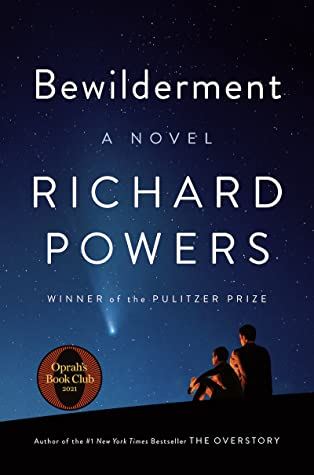
Bewilderment is a heartrending novel from the Pulitzer Prize author, Richard Powers. The astrobiologist, Theo Byrne, searches for life throughout the cosmos while singlehandedly raising his unusual nine-year-old son, Robin, following the death of his wife. Robin is funny, loving, and filled with plans. He thinks and feels deeply, and can spend hours painting elaborate pictures of the endangered animals he loves. He is also about to be expelled from third grade for smashing his friend in the face.
What can a father do, when the only solution offered to his troubled son is to put him on psychoactive drugs? What can he say when his boy comes to him wanting an explanation for a world that is clearly in love with its own destruction?
With its soaring descriptions of the natural world, its tantalizing visions of life beyond and its account of a father and son's ferocious love, Bewilderment marks Richard Powers's most intimate and moving novel. At its heart lies the question: How can we tell our children the truth about this beautiful, imperilled planet?
MARCH 16 - JOANNA GOODMAN: THE FORGOTTEN DAUGHTER
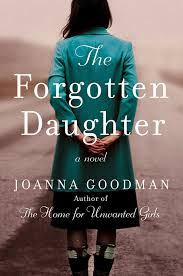 The Forgotten Daughter begins in 1992: French-Canadian factions renew Quebec’s fight to gain independence, and wild, beautiful Véronique Fortin, daughter of a radical separatist convicted of kidnapping and murdering a prominent politician in 1970, has embraced her father’s cause. So it is a surprise when she falls for James Phénix, a journalist of French-Canadian heritage who opposes Quebec separatism. Their love affair is as passionate as it is turbulent, as they negotiate a constant struggle between love and morals.
The Forgotten Daughter begins in 1992: French-Canadian factions renew Quebec’s fight to gain independence, and wild, beautiful Véronique Fortin, daughter of a radical separatist convicted of kidnapping and murdering a prominent politician in 1970, has embraced her father’s cause. So it is a surprise when she falls for James Phénix, a journalist of French-Canadian heritage who opposes Quebec separatism. Their love affair is as passionate as it is turbulent, as they negotiate a constant struggle between love and morals.
At the same time, James’s older sister, Elodie Phénix, one of the Duplessis Orphans, becomes involved with a coalition demanding justice and reparations for their suffering in the 1950s when Quebec’s orphanages were converted to mental hospitals, a heinous political act of Premier Maurice Duplessis which affected 5,000 children.
Véronique is the only person Elodie can rely on as she fights for retribution, reliving her trauma, while Elodie becomes a sisterly presence for Véronique, who continues to struggle with her family’s legacy.
The Forgotten Daughter is a moving portrait of true love, familial bonds, and persistence in the face of injustice. As each character is pushed to their moral brink, they will discover exactly which lines they’ll cross—and just how far they’ll go for what they believe in.
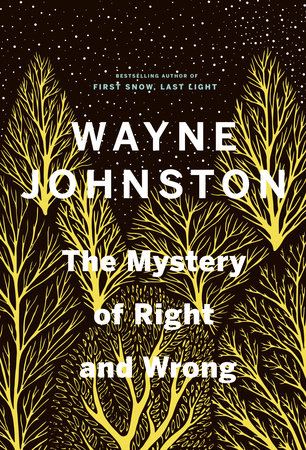
In The Mystery of Right and Wrong Wayne Johnston reveals haunting family secrets he's kept for more than 30 years, unfolding them in a novel that grapples with sexual abuse, male violence and madness.
Wade Jackson, a young man from a Newfoundland outport, wants to be a writer. In the university library in St. John's, where he goes every day to absorb the great books of the world, he encounters the fascinating, South African-born Rachel van Hout, and soon they are lovers.
Rachel is the youngest of four van Hout daughters. Her Dutch-born father, Hans, lived in Amsterdam during WWII, and says he was in the Dutch resistance. After the war, he emigrated to South Africa, where he met his wife, Myra, had his daughters and worked as an accounting professor at the University of Cape Town. Something happened, though, that caused him to uproot his family and move them all, unhappily, to Newfoundland.
Wade soon discovers that the beautiful van Hout daughters are each in their own way a wounded soul. The oldest, Gloria, at twenty-eight has a string of broken marriages behind her. Carmen is addicted to every drug her Afrikaner drug-pusher husband, Fritz, can lay his hands on. Bethany, aka Deathany, the most sardonic and self-deprecating of the sisters, is fighting a losing battle with anorexia. And then there is Rachel, who reads The Diary of Anne Frank obsessively, and diarizes her days in a secret language of her own invention, writing to the point of breakdown and beyond.
As the truth works its way inevitably to the surface, Wade learns that nothing in the world of the van Houts is what it seems, and that Rachel's obsession with Anne Frank has deeper and more disturbing roots than he could ever have imagined.
Wayne Johnston takes beautiful risks here, bringing the abuser, Hans, to life largely through the verses of the ballad Hans composes to indoctrinate his little girls. Confronting the central mystery of his own and Rachel's lives, Wayne has transfigured the "material," creating a tour-de-force that pulls the reader toward a conclusion both inevitable and impossible to foresee.
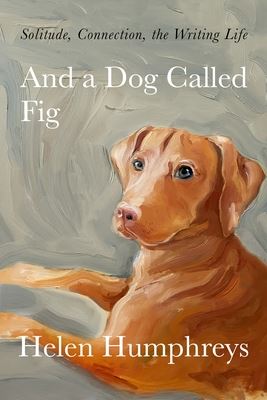 Into the writer’s isolation comes a dog, to sit beside the chair or to lie on the couch while the writer works, to force them outside for a walk, and suddenly, although still lonely, the writer has a companion
Into the writer’s isolation comes a dog, to sit beside the chair or to lie on the couch while the writer works, to force them outside for a walk, and suddenly, although still lonely, the writer has a companion
An artist’s solitude is a sacred space, one to be guarded and kept apart from the chaos of the world. This isolation allows for uninhibited wandering, uninterrupted meditation and the nurturing of sparks of inspiration into fires of creation. But in the artist’s quiet there is also loneliness, self-doubt, the possibility of collapsing too far inward.
What an artist needs is a familiar, a creature perfectly suited to accompany them on this coveted, difficult journey. They need a companion with emotional intelligence, innate curiosity, passion and energy and an enthusiasm for the world beyond, but also the capacity to sleep contentedly for many hours. What an artist needs, Helen Humphreys would say, is a dog.
And a Dog Called Fig is a memoir of the writing life told through the dogs Humphreys has lived with and loved over a lifetime, culminating with the recent arrival and settling in of Fig, a Vizsla puppy. Interspersed are stories of other writers and their irreplaceable companions: Virginia Woolf and Grizzle, Gertrude Stein and Basket, Thomas Hardy and Wessex—the dog who walked the dining table at dinner parties, taking whatever he liked—and many more.
It’s a book about companionship and loss and creativity that is filled with the beauty of a steadfast canine friend and the restorative powers of nature. It is also a book about craft, divided into sections that echo the working parts of a novel—Beginnings, Character, Pacing, Setting, Structure, Process, Endings. Just as every work of art is different, every dog is different—with distinctive needs and lessons to offer. And if we let them guide us, they, like art, will show us many worlds we would otherwise miss.
MAY 25 – DONNA MORRISSEY: PLUCK: A MEMOIR OF A NEWFOUNDLAND CHILDHOOD AND THE RAUCOUS, TERRIBLE, AMAZING JOURNEY TO BECOMING A NOVELIST
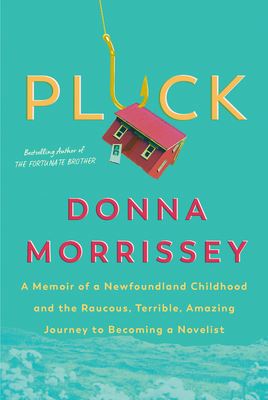 When Donna Morrissey left the only home she had ever known, an isolated Newfoundland settlement, at age 16, she was ready for adventure. She had grown up without television or telephones but had absorbed the tragic stories and comic yarns of her close-knit family and community. The death of her infant brother marked the family, and years later, Morrissey suffers devastating guilt about the accidental death of her teenage brother, whom she'd enticed to join her in the oilfields.
When Donna Morrissey left the only home she had ever known, an isolated Newfoundland settlement, at age 16, she was ready for adventure. She had grown up without television or telephones but had absorbed the tragic stories and comic yarns of her close-knit family and community. The death of her infant brother marked the family, and years later, Morrissey suffers devastating guilt about the accidental death of her teenage brother, whom she'd enticed to join her in the oilfields.
In another writer's hands, Morrissey's account of her personal story could easily be a tragedy. Instead, she combines darkness and light, levity and sadness into her tale, as her indomitable spirit and humour sustain her. Morrissey's path takes her from the drudgery of being a grocery clerk to western oilfields, to marriage and divorce and working in a fish-processing plant to support herself and her two young children. Throughout her struggles, she nourishes a love of learning and language.
Morrissey layers her account of her life with stories of those who came before her, a breed rarely seen in the modern world. It centers around iron-willed women: mothers and daughters, wives, sisters, teachers and mentors who find the support, the wind for their wings, outside the bounds given to them by nature. And it is a mysterious older woman she meets in Halifax who eventually unleashes the writer that Morrissey is destined to become.
An inspiring and insightful memoir, Pluck illustrates that even when you find yourself unravelling, you can find a way to spin the yarns that will save you--and delight readers everywhere.
June 15 – NITA PROSE: THE MAID
 “I am your maid. I know so much about you. But when it comes down to it: what is it that you know about me?”
“I am your maid. I know so much about you. But when it comes down to it: what is it that you know about me?”
Molly Gray is not like everyone else. She struggles with social skills and misinterprets the intentions of others. Her gran used to interpret the world for her, codifying it into simple rules that Molly could live by.
Since Gran died a few months ago, twenty-five-year-old Molly has had to navigate life’s complexities all by herself. No matter—she throws herself with gusto into her work as a hotel maid. Her unique character, along with her obsessive love of cleaning and proper etiquette, make her an ideal fit for the job. She delights in donning her crisp uniform each morning, stocking her cart with miniature soaps and bottles, and returning guest rooms at the Regency Grand Hotel to a state of perfection.
But Molly’s orderly life is turned on its head the day she enters the suite of the infamous and wealthy Charles Black, only to find it in a state of disarray and Mr. Black himself very dead in his bed. Before she knows what’s happening, Molly’s unusual demeanour has the police targeting her as their lead suspect. She quickly finds herself caught in a web of deception, one she has no idea how to untangle. Fortunately for Molly, friends she never knew she had unite with her in a search for clues to what really happened to Mr. Black—but will they be able to find the real killer before it’s too late?
A Clue-like, locked-room mystery and a heart warming journey of the spirit, The Maid explores what it means to be the same as everyone else and yet entirely different—and reveals that all mysteries can be solved through connection to the human heart.
JUNE 20 – EVA STACHNIAK: THE SCHOOL OF MIRRORS

During the reign of Louis XV, impoverished but lovely teenage girls from all over France are sent to a discreet villa in the town of Versailles. Overseen by the King's favourite mistress, Madame de Pompadour, they will be trained as potential courtesans for the King. When the time is right, each girl is smuggled into the palace of Versailles, with its legendary Hall of Mirrors. There they meet a mysterious but splendidly dressed man who they're told is merely a Polish count, a cousin of the Queen. Living an indulgent life of silk gowns, delicious meals and soft beds, the students at this "school of mirrors" rarely ask questions, and when Louis tires of them, they are married off to minor aristocrats or allowed to retire to one of the more luxurious nunneries.
Beautiful and impressionable Véronique arrives and quickly becomes a favourite of the King. But when she discovers her lover's true identity, she is whisked away, sent to give birth to a daughter in secret, and then to marry a wealthy Breton merchant.
This is also the story of the King's daughter by Véronique—Marie-Louise. Well provided for in a comfortable home, Marie-Louise has never known her mother, let alone her father. Capable and intelligent, she discovers a passion for healing and science, and becomes an accredited midwife, one of the few reputable careers for women like her. Eventually Véronique comes back into her daughter’s life, bringing with her the secret of Marie-Louise's birth. But it's a volatile time in France . . . and those with royal relatives must mind their step very carefully.
Gorgeously written and with a breathless pace, this is the story of a mother and a daughter—at the centre of cataclysmic personal and public turmoil.